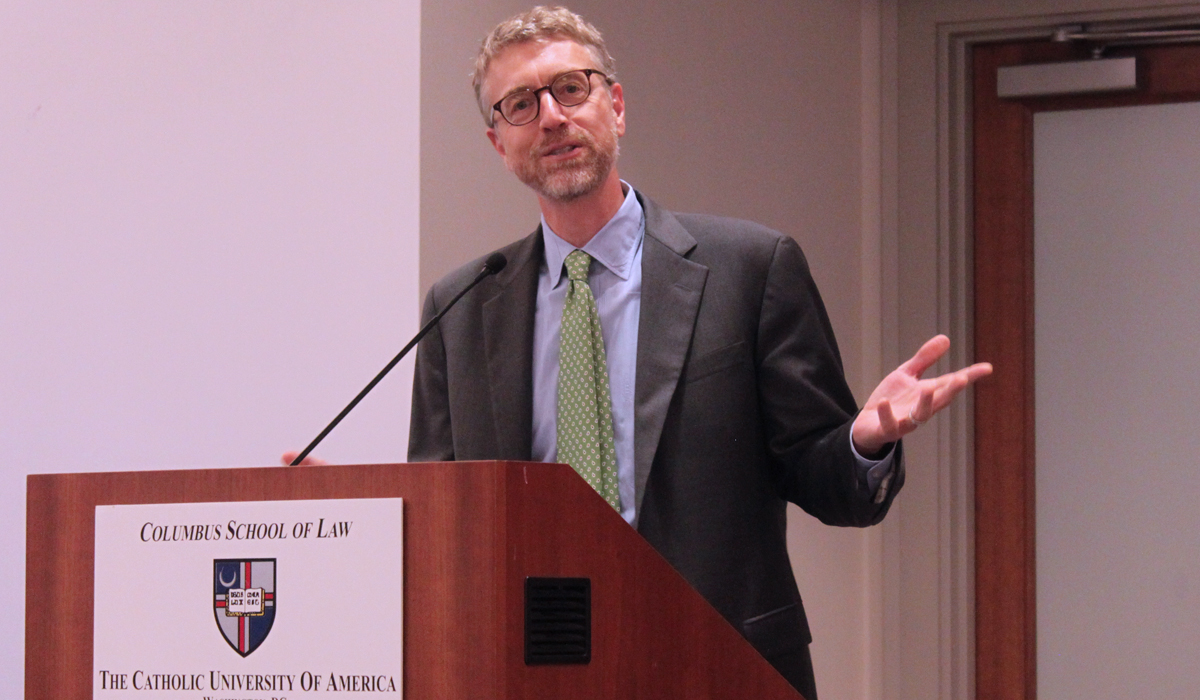Students who complete the requirements listed below receive a certificate in Law and Public Policy in addition to a J.D. upon graduation.
The course requirements for the LPP Program are:
♦ Becoming a Public Policy Lawyer (two credits)
Taught by Jorge Castro, this course provides LPP students with the foundation for understanding the public policy-making process. The course examines policy-making from the perspective of the executive and legislative branches, and assesses the role of the media in affecting policy outcomes. The course also serves as a forum for reflecting on public policy implementation, the role of the lawyers in the policy-making process, and allows students to share their experiences as legal externs.
In-class exercises, such as simulated Congressional hearings and mock cabinet meetings complement more traditional classwork. In addition, students research and analyze a public policy issue that relates to their externship work and write a paper examining the role of law and lawyers in the implementation of that issue. Guest speakers hail from the upper echelons of Washington policy-makers and provide inside glimpses on how policy is really made.
The course is taken in the fall semester of a student’s second year (day) or third year (evening).
♦ Public Policy Practicum (three credits)
This course engages students in intensive research and writing on issues of public policy and in reflective study of professional and policy issues in their accompanying fieldwork or clinical work. It is required for third-year day students in the Law and Public Policy Program. Evening students in LPP may take this course during the third or fourth year. The course is open to other students if space is available.
In this course students research and write several papers in different formats on a public policy issue of their choice. Papers identify a problem in current law and policy and develop a proposal for change. Students learn how to market and advocate for their proposals, through oral presentations, elevator speeches, and simulated meetings. Student projects run the gamut of tackling federal policy issues relating to immigration or health care reform to issues of more local concern, such as improved nutritional content in school lunches. Regardless of the issues covered, students are exposed to the process of conceiving, designing, and implementing public policy – all with an eye of how best to identify and persuade the decision maker. As in the Becoming a Public Policy Lawyer course, guest speakers expose students to policy-making in Washington at the highest levels. Ms. Moffett, Mr. Netram.
♦ Administrative Law (three credits)
This course is a core part of the law school curriculum and of obvious relevance to public policy lawyers. The course involves the study of how law is made at the administrative level, including formal and informal processes within various administrative agencies, as well as judicial, legislative, and executive control of administrative activity. The course addresses the investigative, interpretative, rulemaking, adjudicatory, and enforcement operations of administrative agencies.
♦ Politics Elective
LPP students may choose from one of six courses:
- Campaign Finance
- Civil Rights
- Election Law
- Legislation: The Meaning and Making of a Federal Statute
- Lobbying and the Law
- Congressional Investigations
In lieu of the Politics Elective, students may pursue a second externship (see below).
♦ Public Policy Elective
Each LPP student must take a course with a substantial public policy component. Course selections must be approved by the Director and may be taken at any time. Ideally, the course should complement and inform the student’s focus on a particular policy area or help a student to develop public policy-related skills.
♦ Externships
Each LPP student must take at least one externship for credit. Externships require students to spend ten to twenty hours per week at their placements. Externships may be at executive agencies, on Capitol Hill, with a nonprofit organization, or at a law firm, among other possibilities. Students may take a second externship instead of the Politics Elective, which may be a Catholic Law clinic.
Externships typically are taken concurrently with the Becoming a Public Policy Lawyer class, and (for second externships) the fall semester of the Practicum. These classes dovetail with the externships in order to provide a forum for students to reflect on and share their experiences of the public policy process through the externships. Additional information on externships can be found here.
The Law School Announcements contain additional information about these courses.

